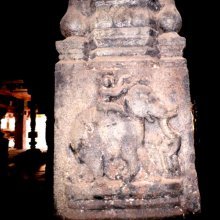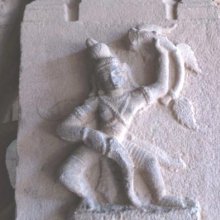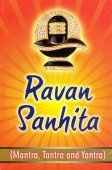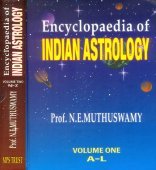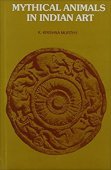Aman, Āman, A-man, Amaṇ, Āmāṉ: 6 definitions
Introduction:
Aman means something in Hinduism, Sanskrit, Hindi, biology, Tamil. If you want to know the exact meaning, history, etymology or English translation of this term then check out the descriptions on this page. Add your comment or reference to a book if you want to contribute to this summary article.
Images (photo gallery)
(+22 more images available)
In Hinduism
Ayurveda (science of life)
Nighantu (Synonyms and Characteristics of Drugs and technical terms)
Source: WorldCat: Rāj nighaṇṭuAman in the Tamil language refers to Yavānī, also identified with Trachyspermum ammi Linn. or “ajwain” from the Apiaceae or “celery” family of flowering plants, according to verse 6.38-40 of the 13th-century Raj Nighantu or Rājanighaṇṭu. Other than the Tamil word Aman, there are more synonyms identified for this plant among which fifteen are in Sanskrit.

Āyurveda (आयुर्वेद, ayurveda) is a branch of Indian science dealing with medicine, herbalism, taxology, anatomy, surgery, alchemy and related topics. Traditional practice of Āyurveda in ancient India dates back to at least the first millenium BC. Literature is commonly written in Sanskrit using various poetic metres.
Biology (plants and animals)
Source: Wisdom Library: Local Names of Plants and DrugsAman [ꯑꯥꯃꯟ] in the Manipuri language is the name of a plant identified with Lannea coromandelica (Houtt.) Merr. from the Anacardiaceae (Cashew) family having the following synonyms: Dialium coromandelicum, Lannea grandis, Odina wodier. For the possible medicinal usage of aman, you can check this page for potential sources and references, although be aware that any some or none of the side-effects may not be mentioned here, wether they be harmful or beneficial to health.

This sections includes definitions from the five kingdoms of living things: Animals, Plants, Fungi, Protists and Monera. It will include both the official binomial nomenclature (scientific names usually in Latin) as well as regional spellings and variants.
Languages of India and abroad
Sanskrit dictionary
Source: Cologne Digital Sanskrit Dictionaries: Monier-Williams Sanskrit-English DictionaryĀman (आमन्):—[=ā-√man] [Ātmanepada] ([imperative] 2. [dual number] ā-manyethām) to long to be at, wish one’s self at, [Ṛg-veda iii, 58, 4 and viii, 26, 5.]
Sanskrit, also spelled संस्कृतम् (saṃskṛtam), is an ancient language of India commonly seen as the grandmother of the Indo-European language family (even English!). Closely allied with Prakrit and Pali, Sanskrit is more exhaustive in both grammar and terms and has the most extensive collection of literature in the world, greatly surpassing its sister-languages Greek and Latin.
Hindi dictionary
Source: DDSA: A practical Hindi-English dictionary1) Aman in Hindi refers in English to:—(nm) peace, tranquillity; -[amana] peace and order; -[caina] peace and happiness; ~[pasamda] peaceful, pacific, peace-loving; ~[pasamdi] pacifism, peace-lovingness, the state or mental attitude of liking peace..—aman (अमन) is alternatively transliterated as Amana.
2) Aman in Hindi refers in English to:—(nf) assurance of protection/security..—aman (अमान) is alternatively transliterated as Amāna.
...
Tamil dictionary
Source: DDSA: University of Madras: Tamil LexiconAmaṇ (அமண்) noun < śramaṇa.
1. Jainism; சமணமதம். வல்லமணாசற [samanamatham. vallamanasara] (தேவாரம் [thevaram] 861, 11).
2. Jainas, as a sect; சமணர். வல்லமண் விடுத்த வேழம் [samanar. vallaman vidutha vezham] (திருவிளையாடற் புராணம் அங்கம். [thiruvilaiyadar puranam angam.] 3).
3. Nakedness, nudity; அரையில் ஆடையில்லாமை. குவிமுலையார் தம்முன் னே நாணமின்றி . . . அமணே நின்றார் [araiyil adaiyillamai. kuvimulaiyar thammun ne nanaminri . . . amane ninrar] (தேவாரம் [thevaram] 962, 7).
4. A masquerade dance; வரிக்கூத்துவகை. [varikkuthuvagai.] (சிலப்பதிகாரம் அரும்பதவுரை [silappathigaram arumbathavurai] 3, 13, உரை. [urai.])
--- OR ---
Āmāṉ (ஆமான்) [ā-māṉ] noun < ஆ⁸ [a⁸] + மான். [man.] See ஆமா¹. [ama¹.] அந்தழைக் காடெலாந் திளைப்ப வாமானினம் [anthazhaig kadelan thilaippa vamaninam] (சீவகசிந்தாமணி [sivagasindamani] 1902).
Tamil is an ancient language of India from the Dravidian family spoken by roughly 250 million people mainly in southern India and Sri Lanka.
Nepali dictionary
Source: unoes: Nepali-English DictionaryAman is another spelling for अमन [amana].—n. 1. tranquility; peace; 2. loss of hunger;
Nepali is the primary language of the Nepalese people counting almost 20 million native speakers. The country of Nepal is situated in the Himalaya mountain range to the north of India.
See also (Relevant definitions)
Starts with (+232): Amaanavtaa, Amamdadhvani, Amamdanamda, Amamdaruci, Amamdasaumdarya, Amamdasneha, Amamdasnehi, Amamga, Amamgalahari, Amamgalakara, Amamgalakari, Amamgale, Amamtamasa, Amamtani, Amamtiya, Amamtranamgey, Amamtrisu, Amamtrite, Aman mussa, Amana.
Ends with (+701): Aaman, Abhipraman, Abhisheka-naman, Abhyavaman, Acchidrayaman, Accuvattaman, Acuvattaman, Adaman, Adhogaman, Adityanaman, Agharmadhaman, Agharmmadhaman, Agninaman, Agnishtomasaman, Ahahsaman, Ahamnaman, Ahinaman, Ahitanaman, Akhidrayaman, Akraman.
Full-text (+11746): Manuja, Purusha, Manusha, Manava, Pumvat, Stridhava, Agredidhishu, Mushkara, Jahusha, Aman mussa, Vaisucana, Purushaka, Nrimedha, Punyapurusha, Tashit aman, Plavaka, Nishada, Manushya, Vyavasayi, Kshetrapala.
Relevant text
Search found 431 books and stories containing Aman, Āman, A-man, Amaṇ, Āmāṉ, Ā-man, Ā-māṉ, Aamaan; (plurals include: Amans, Āmans, mans, Amaṇs, Āmāṉs, māṉs, Aamaans). You can also click to the full overview containing English textual excerpts. Below are direct links for the most relevant articles:
A Happy Married Life (by Venerable K. Sri Dhammananda)
Sex < [Part 1 - The Nature Of Love And Pleasure]
Advice 1 - The Wife < [The Buddha's Advice To A Couple]
Rig Veda (translation and commentary) (by H. H. Wilson)
The Bhikkhus Rules (by Bhikkhu Ariyesako)
Matchmaking < [Chapter 2 - Relationships]
Intruding On Families < [Chapter 4 - Right Livelihood For A Bhikkhu]
Becoming A Bhikkhu < [Part Two]
Yoga-sutras (with Bhoja’s Rajamartanda) (by Rajendralala Mitra)
Sūtra 1.27 < [First Chapter (Samadhi Pada)]
Sūtra 1.8 < [First Chapter (Samadhi Pada)]
Sūtra 4.8 < [Fourth Chapter (Samadhi Pada)]
A Discourse on Paticcasamuppada (by Venerable Mahasi Sayadaw)
Chapter 12 - Birth And Suffering < [Part 8]
Chapter 6 - Parami And Kamma < [Part 7]
Chapter 2 - Life-cycle < [Part 9]
The Markandeya Purana (by Frederick Eden Pargiter)
Related products
(+1 more products available)

